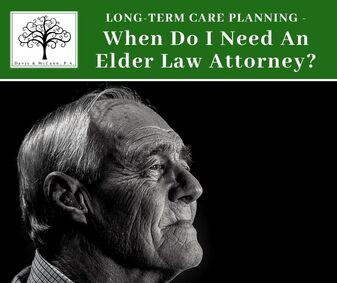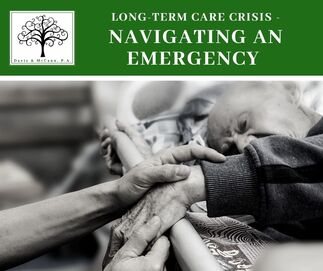 If you’re healthy, you’ve probably never really thought about long-term care or Medicaid planning. However, statistically, the vast majority of individuals will end up needing nursing home care at some point during their lives. Some people are able to apply and qualify for Medicaid benefits without hiring an attorney to assist them. However, there are many individuals who could greatly benefit from having an elder law attorney guide them in creating and implementing a long-term care or Medicaid plan. Below are a few situations where you might want to consider hiring an elder law attorney: 1. If you are in immediate need of full-time nursing home care, have more than $15,000 in countable assets, and need Medicaid benefits to help pay for your care, it might be worthwhile to hire an experienced elder law attorney to assist you. Your attorney can complete your Medicaid application and serve as a liaison with the state Medicaid office and nursing home facility. This move can improve your chances of preserving as many assets as possible as well as increasing your chances of receiving all Medicaid benefits for which you might be eligible. 2. If you are living at home and your spouse requires full-time nursing care in a facility, an attorney can help expedite the Medicaid application process to reduce costs. Additionally, an attorney can show you ways to protect your financial interests so that you can live more comfortably at home and not feel the need to spend all of your assets down on your spouse’s care. 3. If you and your spouse both require care, hiring an experienced attorney to help with the Medicaid application process and spenddown rules can save your adult children time, money and stress. 4. If you and your spouse are healthy and not in need of immediate care, an elder law attorney can provide you with long-term care planning advice that can help you avoid missing time-sensitive asset protection opportunities. How much will an elder law attorney cost? In most situations, attorney’s fees rarely exceed the cost of one to two months of long-term nursing home care. For more information on long-term care planning and Medicaid issues, please contact Davis & McCann, P. A., Dodge City, KS. We are members of Wealth Counsel, a national consortium of Estate Planning Attorneys and the National Academy of Elder Law Attorneys (NAELA). We focus our practice on providing clients with the best legal advice on Estate Planning, Medicaid and Long-term Care Planning, Family Business/Small Business Succession Planning, Probate, Trust Administration, Real Estate Transactions, and related matters.  When a person needs help paying for skilled nursing care, they can apply for government Medicaid assistance. In Kansas, the state agency administering Medicaid benefits is known as KanCare. To qualify for KanCare benefits, you may not have more than $2,000.00 in total countable resources. What are “countable resources”? Sometimes referred to as liquid assets, countable resources are assets that the government has determined an individual can easily convert to cash to pay expenses such as skilled nursing care. Examples of countable resources include: cash, stocks, bonds, investments, savings and checking accounts, certificates of deposit (CDs), retirement funds (excluding pensions) and real estate (excluding your personal residence and business income producing assets, like farmland). Some assets not typically considered “countable” by KanCare when determining your eligibility for benefits include: personal keepsakes and belongings, household goods and furnishings, one vehicle (under some situations, like if a spouse is still living at home), life insurance policies without a cash value, burial plots, irrevocable funeral plans with cash of less than $7,000.00, and your personal residence. If you have gifted away any assets within the five years prior to your nursing home admission date, KanCare will use the value of those assets to calculate a penalty period. A penalty period is a time that an individual is not eligible to receive Medicaid benefits. It’s important to note that assets that have been gifted, either outright or into a trust like a Medicaid Asset Protection Trust, more than five years before an individual applies for Medicaid benefits are not countable for Medicaid eligibility purposes under current law. If a person has more than $2,000.00 in countable resources, they will not be considered Medicaid eligible until they have done what is commonly referred to as a “spenddown”. However, it is important to note that not all of the assets that must be spent down have to be toward the nursing home care. Instead, an individual can use some of their countable resources for their own benefit, so long as the expenditure abides by Medicaid rules. Depending on your unique situation, these expenditures might include: prepaying for funeral and burial expenses up to a specified amount, paying some debts, doing certain home improvements, particularly if a spouse is still living at home, paying medical bills (doctor, dentist, vision), purchasing clothing for the individual being admitted, or even purchasing a vehicle in some instances. To ensure your expenditures will meet with Medicaid approval, you might want to run your spenddown plan by an elder law attorney prior to moving forward and please keep receipts and records. If KanCare challenges the validity of your purchases, you must be able to prove that the expenses met their guidelines. If you have questions about Medicaid planning or long-term care planning, contact Davis & McCann, P.A., Dodge City, Kansas at 620-225-1674. We are members of Wealth Counsel, a national consortium of Estate Planning Attorneys and the National Academy of Elder Law Attorneys (NAELA). We focus our practice on providing clients with the best legal advice on Estate Planning, Medicaid and Long-term Care Planning, Special Needs Planning, Family Business/Small Business Succession Planning, Probate, Trust Administration, Real Estate, 1031 Exchanges, and related matters.  What can long-term care planning or Medicaid planning do for you? For starters, it can save you thousands of dollars on current or future long-term care. According to a 2020 Genworth study on nursing home costs, the average semi-private, full-time nursing home room in Kansas costs approximately $6,691.00 monthly ($80,292.00 annually). With this type of price tag, people are starting to realize the importance of planning for their end-of-life expenses. If you are healthy and in no need of immediate care, you might want to seek advice on long-term care planning from an experienced elder law attorney. Upon examining a comprehensive list of your assets and their values and listening to your objectives, your attorney may suggest any number of legal strategies to help you accomplish your goals. A few of these suggestions might include purchasing a long-term care insurance policy, creating and funding an irrevocable Medicaid Asset Protection Trust, establishing a gifting plan to family members, transferring assets by beneficiary designations and transfer-on-death designations, or forming some type of business entity. The type of legal strategies recommended for you will depend on your unique situation. Medicaid planning is the term commonly used to preserve assets for individuals already residing in or having an impending need for full-time, skilled nursing home care. Planning at this stage is often referred to as crisis planning. Once again, an elder law attorney will need a comprehensive list of your assets and their values, as well as information on any income streams that you have. Depending on your goals, assets, income, life expectancy, and other issues unique to your situation, your attorney might recommend purchasing a Medicaid annuity, initiating an asset gifting program, purchasing a prepaid funeral plan, having home improvement repairs done on your residence, or any other number of planning choices. All of these are viable options that many people are unaware they can utilize, particularly once someone has already been placed in a long-term care facility. However, be cautious when moving forward with a Medicaid spenddown, because if not done correctly, it can result in a refusal of benefits. Hiring an experienced elder law attorney is a good way to ensure that mistakes are avoided so that you can qualify more easily for Medicaid while preserving the greatest amount of assets allowed by law for your family. If you have questions about Medicaid planning or long-term care planning, contact Davis & McCann, P.A., Dodge City, Kansas at 620-225-1674. We are members of Wealth Counsel, a national consortium of Estate Planning Attorneys and the National Academy of Elder Law Attorneys (NAELA). We focus our practice on providing clients with the best legal advice on Estate Planning, Medicaid and Long-term Care Planning, Special Needs Planning, Family Business/Small Business Succession Planning, Probate, Trust Administration, Real Estate, 1031 Exchanges, and related matters.  In a perfect world, everyone would establish a long-term care plan well in advance of needing such care, all the necessary finances to pay for any such needs would be in order and everyone in the family would be prepared to help execute that plan at any given moment. But the reality is that most people procrastinate on any type of planning that focuses on the possibility of serious illness or death. When an unplanned event happens that requires immediate long-term care, and in the absence of an existing plan, long-term care ‘crisis’ planning can help you navigate the days to come. What is Long-term care ‘crisis’ planning? This term is based on the notion that an event occurred that now requires you to make decisions regarding long-term nursing home care, including addressing the cost of such care, in a short period of time. Your first step might be to seek advice from professionals who are trained in the area of long-term care planning and stay current on the best methods for addressing your situation, as the rules and regulations of Medicaid are complicated and change frequently. Below are a few of the ways a trained professional might help you manage your long-term care crisis situation:
For more information on long-term care crisis planning, contact Davis & McCann, P. A., Dodge City, KS. We are members of Wealth Counsel, a national consortium of Estate Planning Attorneys and Elder Law. We focus our practice on providing clients with the best legal advice on estate planning, Medicaid and Long-term Care Planning, Family Business/Small Business Succession Planning, Probate, Trust Administration, Real Estate Transactions, 1031 Exchanges, and related matters.  November is Long-term Care Awareness Month. Statistics show that between 50%-70% of our population who reach age 65 will require long-term care at some point in their life. Losing all of one’s assets to pay for nursing home care is a legitimate concern for people. With the cost of a private room in a Kansas nursing home at approximately $70,000-$90,000 annually, it’s no wonder why senior citizens are looking for help to preserve at least some of their assets for their heirs. Let’s review some facts about long-term care planning, specifically Medicaid planning. The purpose of Medicaid planning is to preserve your assets and set up your affairs in such a way that the State will pay the majority of your nursing home care costs, if or when the time comes. With good Medicaid planning, you should need only to contribute your income toward nursing home care costs. With Medicaid planning, the goal is to avoid selling your assets to pay for your long-term care. If you have a spouse still living at home, then Medicaid planning may also allow you to preserve income for that spouse rather than paying it to the nursing home. Married Couples: When married couples consider Medicaid planning, the “best case scenario” is to retain the benefits of all their assets and still have Medicaid pay for nursing home care when the time comes. To accomplish this, all planning and funding should be completed five (5) or more years prior to one of the individuals needing full-time nursing home care. If you have less than five (5) years before an anticipated nursing home admission, other options exist to preserve assets, but those options are more limited and vary, based on circumstances. Unmarried persons: A single person can also utilize Medicaid planning, although the percentage of assets preserved may vary, again depending on the circumstances. Elder law generally, and Medicaid planning specifically, is a complex body of law and an area that sees frequent rule revisions. The application process can be a paperwork nightmare, so having an experienced professional to guide you through the system is advisable. You are not required to use an attorney to plan for possible nursing home admissions. However, most nursing home and social services professionals are not trained to provide sophisticated Medicaid planning advice, which can protect the greatest amount of your assets. Additionally, not just any attorney is qualified to advise you on your long-term care options. Look for an attorney specifically trained in Elder law and Medicaid planning issues to provide you with a plan of action to preserve the greatest amount of your assets, as allowed by law. If you have questions about Medicaid or long-term care planning, contact Davis & McCann, P.A., Dodge City, Kansas at 620-225-1674. We are members of Wealth Counsel, a national consortium of Estate Planning Attorneys and the National Academy of Elder Law Attorneys (NAELA). We focus our practice on providing clients with the best legal advice on Estate Planning, Medicaid and Long-term Care Planning, Special Needs Planning, Family Business/Small Business Succession Planning, Probate, Trust Administration, Real Estate, 1031 Exchanges, and related matters.  Don, age 82, and his wife were married for 45 years before she died. Don had no children but was very close with his extended family. After his wife died, Don revised his estate planning to name his sisters, Rita, age 72, and Catherine, age 78, as the sole beneficiaries of his estate. Rita was never married had no children and Catherine and her husband had 3 children. Don was especially concerned about how Rita might be cared for in her later years as she had no family of her own. He was relieved knowing that she would receive one-half of his approximately $200,000 estate when he died. It gave him peace knowing that she would be able to live a more comfortable life using this inheritance, perhaps going on several nice trips or enjoying a few luxuries. While this sounded like a wonderful plan, Don didn’t anticipate that Rita’s health would decline rapidly and she would need full-time nursing home care a short time later. Rita qualified to receive Medicaid benefits after only a few short months and she was well cared for in the local nursing home. Don died two (2) years later and his estate was divided between his sisters just as he had instructed. Unfortunately, what Don didn’t understand was that Rita’s share of the inheritance automatically disqualified her from receiving her Medicaid benefits and she was forced to use her inherited money to pay for her nursing home care, instead of using it to make her life more comfortable. Within less than two (2) years, Rita’s inheritance was gone and she had nothing to show for it. Her level of care at the nursing home did not change and she was unable to use the money for any of the things that her brother wanted. No one can predict the future but if Don had understood that Rita’s inheritance would only be used to pay her nursing home expenses previously being paid by Medicaid, he most likely would have made a different estate planning decision. If Don had revised his estate plan once Rita entered the nursing home to include a Special Needs Trust (SNT) a/k/a Supplemental Needs Trust, for Rita’s benefit, her share of the inheritance could have been held in trust to provide her with the extras that her brother had intended. The Trustee of the SNT would have been able to provide Rita with the things that she wanted or needed to make her life more comfortable, without the trust share disqualifying Rita from receiving Medicaid benefits. This scenario illustrates why it is so important to review your estate planning regularly with your attorney, at least every 3-5 years. Be sure to inform your attorney if one of your intended beneficiaries is receiving government benefits or may be a recipient in the foreseeable future. By adding language to your estate plan that creates a SNT upon your death, your loved one can be guaranteed to receive their inheritance without disqualification from government benefits. If you have questions about of special needs planning or any type of estate plan, contact Davis & McCann, P.A., Dodge City, Kansas at 620-225-1674. We are members of Wealth Counsel, a national consortium of Estate Planning Attorneys and the National Academy of Elder Law Attorneys (NAELA). We focus our practice on providing clients with the best legal advice on Estate Planning, Medicaid and Long-term Care Planning, Special Needs Planning, Family Business/Small Business Succession Planning, Probate, Trust Administration, Real Estate, 1031 Exchanges, and related matters.  If your loved one is facing admission to a nursing home for long-term care and you’re concerned that you won’t have enough money to cover their expenses, there are a few things you should consider. With an average cost of over $5,600 per month for a semi-private nursing home room in Kansas (2019 Genworth Cost of Care Survey), very few of us could afford to private pay for a nursing facility for very long. KanCare is the Kansas Medicaid Program that you will apply to if you need government benefits to assist with payment in Kansas. Too often, well-intentioned friends, neighbors and non-elder law attorneys or other professionals make recommendations on how to apply for Medicaid benefits to cover nursing home expenses that result in a denial or extended delays in benefits, both of which result in unnecessary expenses to the applicant. To prevent this from happening to you, we’re sharing some things to consider:
Now that you are armed with more knowledge, remember to consult with an experienced elder law attorney should you need to file for Medicaid benefits in the future. More than one client has told us after we corrected an inaccurately filed Medicaid application, “I wish I would have just come to see you first!” If you have questions about Kansas elder law or Medicaid planning, contact Davis & McCann, P.A., Dodge City, Kansas at 620-225-1674. We are members of Wealth Counsel, a national consortium of Estate Planning Attorneys and the National Academy of Elder Law Attorneys (NAELA). We focus our practice on providing clients with the best legal advice on Estate Planning, Medicaid and Long-term Care Planning, Special Needs Planning, Family Business/Small Business Succession Planning, Probate, Trust Administration, Real Estate, 1031 Exchanges, and related matters.  Q: My brother-in-law told me that his assets are safe from any Medicaid claims that he might encounter in the future for nursing home care because he has a Revocable Trust. I also have a Revocable Trust, but I didn’t think it protected my assets from Medicaid claims. Who is correct? A: You are. A Revocable Trust does NOT protect your assets from a Medicaid recovery claim against you. A Revocable Trust allows the creator/grantor (you) to make any changes to the Trust at any point in their lifetime, as long as they are competent. Because you have so much control over a Revocable Trust and are the beneficiary of the trust during your lifetime, Medicaid law allows for a claim to be made against assets held in a Revocable Trust just as they could make a claim over assets owned in your individual name. If you or your brother-in-law are concerned about protecting your property and/or other assets from future Medicaid claims related to nursing home or hospital expenses, you need to visit with an estate planning attorney well versed in elder law matters. Generally speaking, if you want to protect certain assets from creditor claims, including Medicaid, your assets must be owned by an IRREVOCABLE Trust, which CANNOT be controlled by you in any way. There are Irrevocable Trusts designed specifically for individuals who are concerned about protecting family assets, such as farm and ranch property that has been in the family for generations, and minimizing the risk of losing those assets to pay for long-term nursing home care. Be aware that this type of planning typically involves making a gift and triggering the 5-year look-back for Medicaid eligibility, so time is of the essence. Postponing planning until it appears that long-term nursing home care is inevitable can significantly decrease your ability to protect many of your assets. However, if you are currently in such a situation where you are facing immediate nursing home admission, don’t despair, there may be other options available to you. If you have questions, it is critically important that you seek out an attorney who understands the Medicaid system as it relates to elder care matters in your State. If you have questions about any estate planning or Medicaid planning matter in Kansas, contact Davis & McCann, P.A., Dodge City, Kansas at 620-225-1674. We are members of Wealth Counsel, a national consortium of Estate Planning Attorneys and the National Academy of Elder Law Attorneys (NAELA). We focus our practice on providing clients with the best legal advice on Estate Planning, Medicaid and Long-term Care Planning, Special Needs Planning, Family Business/Small Business Succession Planning, Probate, Trust Administration, Real Estate, 1031 Exchanges, and related matters.  Q: My mother is a relatively healthy 80 year old. A neighbor suggest that we transfer her home to me and have her retain a life estate interest, so she could avoid losing out on benefits from Medicaid, should she need nursing home care in the next few years. I am an only child and my father passed away years ago. What do you think about this idea? A: If the life estate deed is recorded at least five years before your mother requires a full-time nursing home care, this transfer should not bar her from Medicaid qualification. The rules on Medicaid qualifications for this type of situation are complicated to say the least. However, an overly simplified answer would be that her life estate interest will not be counted as a resource for KanCare (Medicaid program in Kansas) qualification purposes. Maintaining your mother’s home while she is in the nursing facility could potentially strain your finances. If she uses a life estate deed, there are other issues you both should consider, including: 1. Sale. If you plan to sell your mother’s home while she is alive, be aware that selling the house will require your and your mother’s consent. Your mother’s life estate interest has a value and such interest likely will then disqualify her from receiving KanCare benefits for a period of time, during which she will have to private pay for her nursing home care. 2. Gifting and Capital Gains Tax. Remember, that even though you don’t have a tangible asset yet due to your Mom’s life estate interest, you have still been gifted the residuary value of the home. Property that is gifted during your mother’s lifetime does not get a step-up in basis at her death, meaning you will likely have to pay capital gains tax on the property if you sell it. The tax you will owe after the sale could be substantial and will depend on factors such as what your mother paid for the property when she purchased it and what you sell the home for. Additionally, this will result in a penalty if your mother goes into a nursing facility and needs to become Medicaid eligible within 5 years of making the gift. 3. Death of Residuary Owner. What happens if your mother gifts you her home, maintains her life estate and then you die before she does? The property would then go to your estate, which may not be what your mother would want. Instead of deeding the house to you and having your mother retain a life estate interest, your mother may want to consider creating an irrevocable trust and deeding the house to the trust. This gives you a lot more flexibility. The trustee could sell the house and the sale proceeds would not disqualify your mother from KanCare benefits. If the house is not sold, then when your mother passes away, the trust could be set up in such a way that you would receive a “stepped-up basis”, resulting in no capital gains taxes if and when you sold the house. Be aware, that this type of trust is very complicated and not something that should be attempted on your own or without expert guidance. Please see an experienced long-term care estate planning attorney to determine the best course of action for your mother’s unique situation. For more information on Real Estate and Medicaid planning, contact Davis & McCann, P. A., Dodge City, KS. We are members of Wealth Counsel, a national consortium of Estate Planning Attorneys and focus our practice on providing clients with the best legal advice on estate planning, Medicaid and Long-term Care Planning, Special Needs Planning, Family Business/Small Business Succession Planning, Probate, Trust Administration, Real Estate, 1031 Exchanges, and related matters.  If you’re age 65 or older, issues like retirement and long-term care planning are probably more frequent topics of your conversation. Even if you’re not in this population group, chances are you know and care for someone who is. Research from the U. S. Department of Health and Human Services suggests that if you are age 65 or older, you’re most likely going to need long-term care at some point in your life. Unless you are sufficiently wealthy or exceptionally poor, it would seem wise to do some advanced planning to cope with the increasing health care costs that will accompany long-term care stays. Options you may want to investigate include, but are not limited to: 1. Long-term Care Insurance. The older you are and the longer you wait to obtain insurance, the more expensive it will become. Costs for long-term care insurance (LTCI) tend to be expensive and premiums will most likely rise over your lifetime. With average premiums running at $2,700 a year (per industry research firm, LifePlans), seniors may find LTCI too cost prohibitive to be a realistic option. Additionally, your age or current health condition may disqualify you from obtaining this type of insurance. 2. Life Insurance. Some insurance companies offer life insurance with long-term care riders. With this type of policy, your beneficiaries may still receive a death benefit even if you use long-term care rider benefits. With traditional LTCI, there is no death benefit paid to your beneficiaries after your death. 3. Family Members. Your immediate or extended family members may be able and willing to care for you or pay for your health care costs. With annual semi-private nursing home room costs running on average at $90,000 annually, according to a 2019 Genworth study, few families can afford to cover these costs for a year, let alone for multiple years. 4. Medicare. Kansas Medicare program (KanCare) does NOT cover long-term care expenses for patients requiring full nursing home care, except for very limited circumstances. |
NEWS YOU CAN USEDavis & McCann, P. A., Archives
April 2021
Categories
All
|

 RSS Feed
RSS Feed